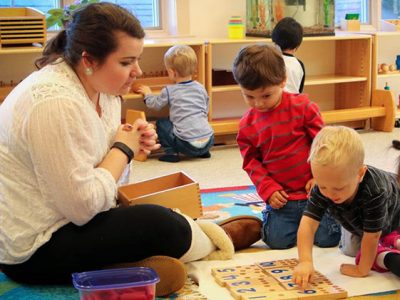
When you first hear about Montessori education, you may find yourself pausing to ponder about what makes it different from traditional education. There are many ways in which this question can be answered. However, what follows here are some of the key differences.
Montessori Classrooms are Prepared
Before your child arrives in the classroom, it’s been prepared with student-centered lessons and activities that are based on the teacher’s observations of their individual needs. In a traditional classroom, this wouldn’t happen because everything is teacher-centered.
Montessori Classrooms are Active
Traditional classrooms are passive in that lessons are orated for students to memorize and be tested on. However, Montessori lessons are both hands-on and active so students get to discover the information for themselves.
Montessori Classrooms Give Children Time
In a traditional classroom your child has time limitations that are mandated by arbitrary schedules. However, these schedules don’t exist in a Montessori classroom. This means that your child can work on a lesson for however long it takes them to master it. When possible, this is done without any interruptions too.
Montessori Classrooms Approach Grade Levels Differently
Montessori schools are more flexible when it comes to grade levels. They’re based on a child’s developmental range instead of being strictly defined by chronological age.
Montessori Classrooms Have Adaptable Curriculum
In a traditional school all the curriculum is predetermined. No consideration is given to an individual child’s needs. However, with Montessori education the curriculum can expand based on a student’s needs.
Montessori Classrooms Allow Children to Pace Themselves
Children are encouraged to work at their own pace in a Montessori classroom instead of being expected to work at the same pace as the rest of the class.
Montessori Classrooms Encourage Self-Esteem and a Love for Learning
Montessori educators understand that children’s self-esteem comes from the pride they derive in the accomplishments they master. As such, they appeal to a child’s innate hunger for learning. This is different from traditional schools where the belief is that external judgment and validation will bring about self-esteem (e.g. grades, standardized testing).
Clearly, you can understand how beneficial a Montessori learning environment can be for your child. So, if you live near Mansfield, Texas, make sure you check out Country Club Montessori School today.



